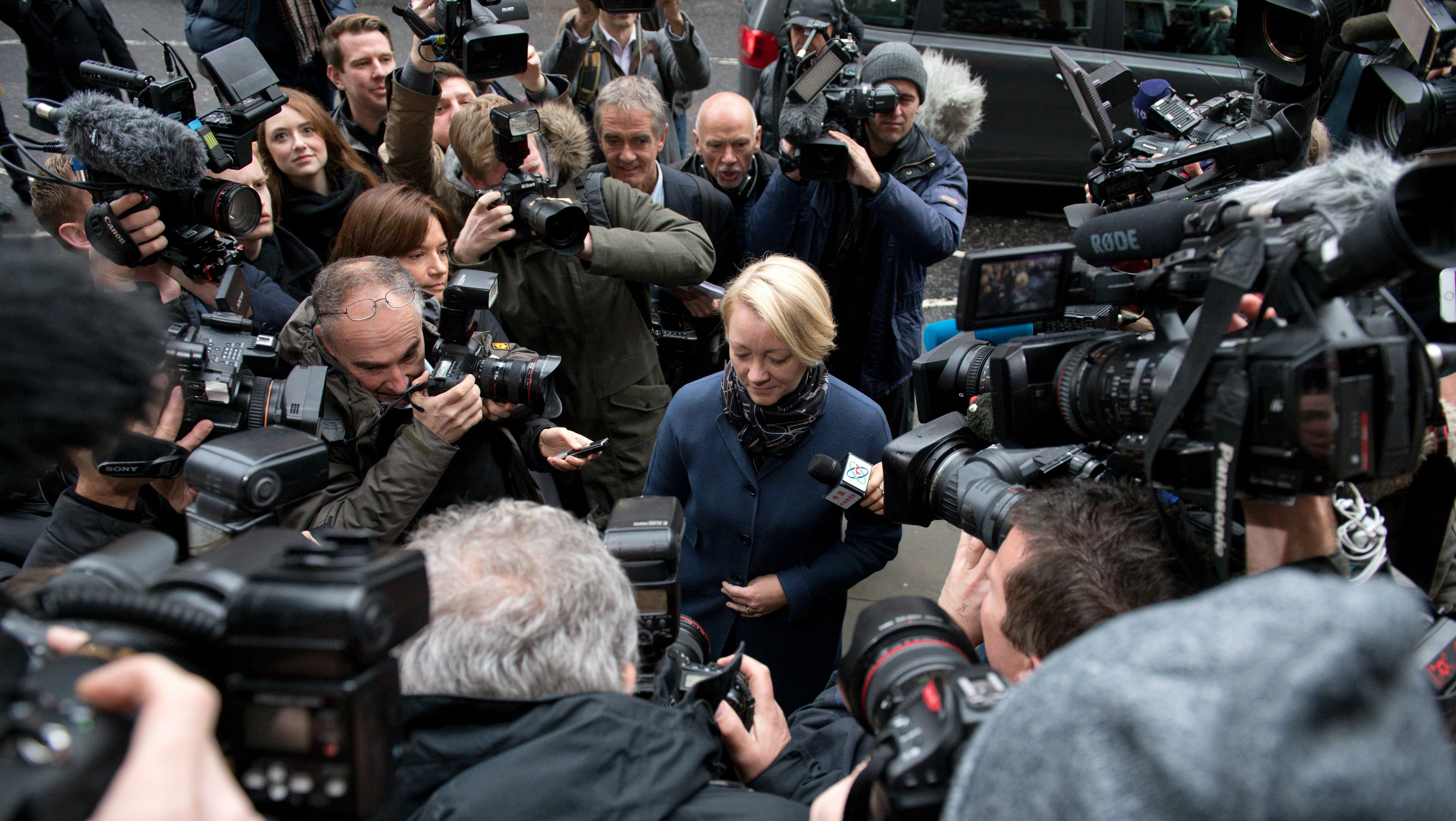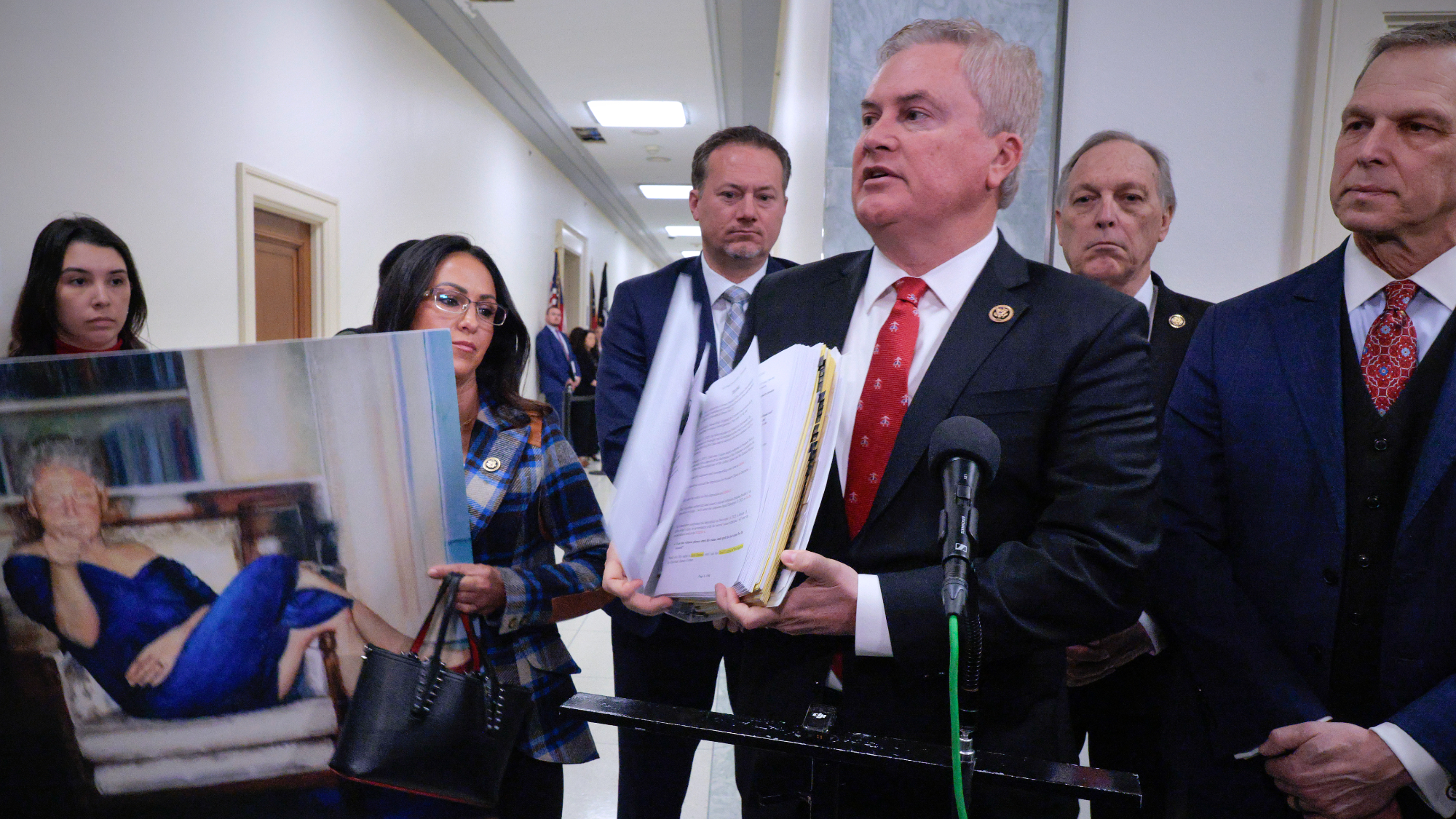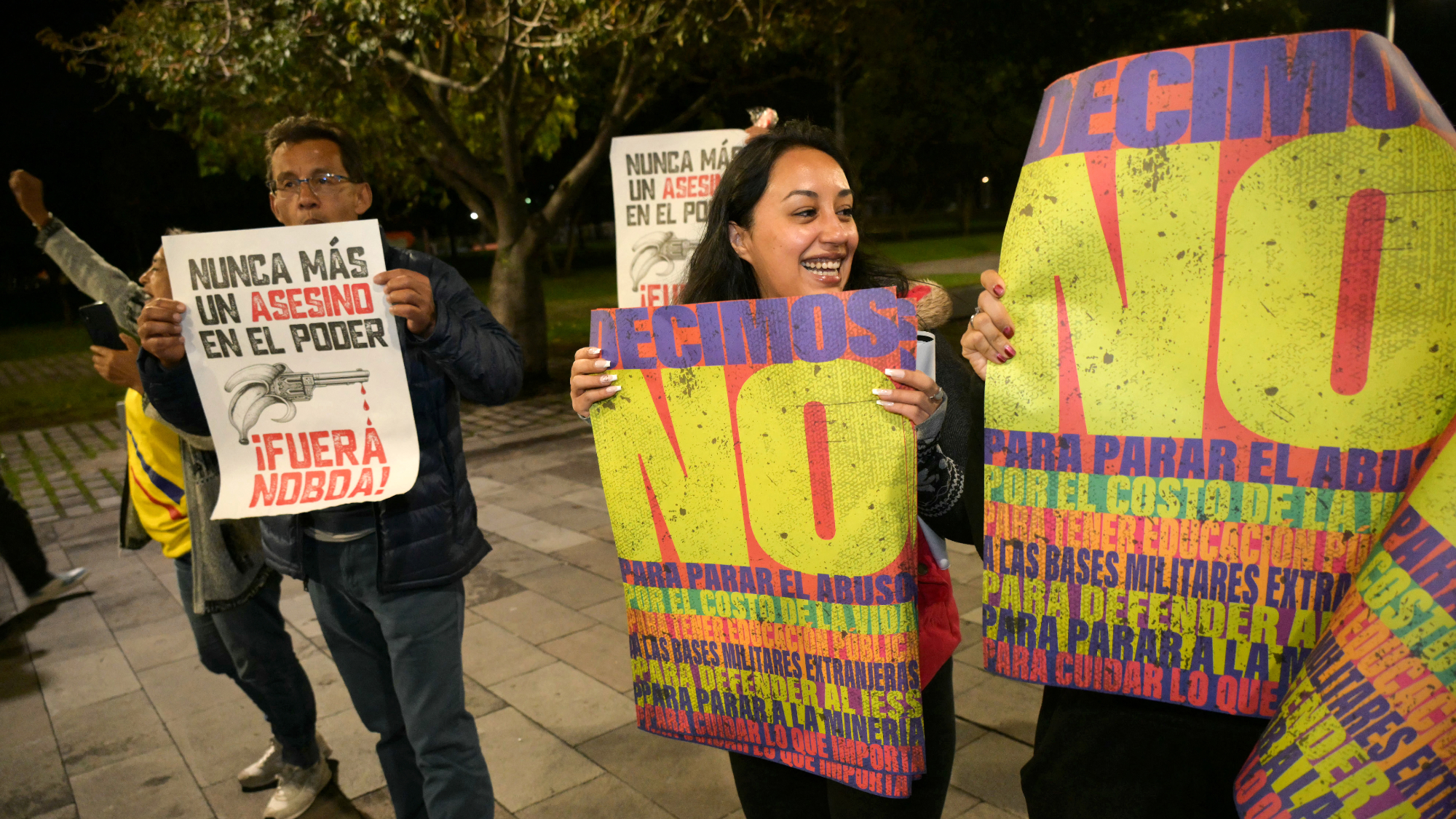Will Julian Assange be forced to leave Ecuador’s London embassy?
WikiLeaks founder reported to have upset recently elected Ecuadorian President Lenin Moreno

A free daily email with the biggest news stories of the day – and the best features from TheWeek.com
You are now subscribed
Your newsletter sign-up was successful
Julian Assange takes on the Roman Empire in new Asterix book
15 October
Julian Assange is the inspiration behind a central character in the newest Asterix and Obelix comic book that's set to be released on 22 October.
The Week
Escape your echo chamber. Get the facts behind the news, plus analysis from multiple perspectives.

Sign up for The Week's Free Newsletters
From our morning news briefing to a weekly Good News Newsletter, get the best of The Week delivered directly to your inbox.
From our morning news briefing to a weekly Good News Newsletter, get the best of The Week delivered directly to your inbox.
Asterix and the Missing Scroll, by the writer Jean-Yves Ferri and illustrator Didier Conrad, is the 36th book in the popular series. The new story will revolve around a propaganda war in the Roman Empire, with a couple of new characters inspired by real-life figures.
One such is Doublepolemix, a peddler-turned-reporter for the Lutece Journal during Caesar's reign, whom the writers are saying is inspired by Assange. "It was more Didier who wished for the character to physically look a bit like Assange even if we can't really say it's him, but it's this type of character," Ferri told The Guardian.
French newspaper Liberation says this is a "great honour" for Assange, but suggests a better name for his comic-book persona would be Wikilix, referencing Assange's eye-opening WikiLeaks files that have made him especially suited to be on the good side of any information war.
Meanwhile, however, the real WikiLeaks founder has more pressing worries: having sought asylum at the Ecuadorian embassy in London, he is now unable to leave it – even for a medical examination – for fear of being arrested,
A free daily email with the biggest news stories of the day – and the best features from TheWeek.com
Assange has long been complaining of shoulder pain. Ecuadorian foreign minister Ricardo Patino yesterday revealed that his country had asked "the British government for a safe passage for humanitarian reasons in coordination with Ecuador, so that Julian Assange can get an MRI".
The British Foreign Office has reportedly declared Assange free to leave at any time, but said the arrest warrant in his name would remain valid regardless of circumstances.
"In other words, 'he can leave – but we will arrest him'," Patino added.
WikiLeaks has come out with a statement of its own, condemning the Foreign Office's decision and pointing out: "The Foreign Minister said that even in times of war and conflict, safe passage is given for humanitarian reasons to ensure that persons are given the medical attention they need."
Assange surveillance goes 'covert' as Met leaves embassy
13 October
Scotland Yard has ended its 24-hour guard of the Ecuadorian embassy where WikiLeaks founder Julian Assange currently resides.
For the past three years, the Metropolitan Police has maintained a continuous watch outside the Knightsbridge building at a cost of millions of pounds to the public in the hope of arresting Assange should he attempt to flee and extraditing him back to Sweden.
Assange, an Australian national, has been living in the Ecuadorian embassy for 40 months, as he is wanted in Sweden following allegations of sexual abuse. He has been a no-show at the Swedish court hearings on his case, fearing extradition to the US, where he might be charged with sedition and espionage due to his WikiLeaks activities.
The Met's move comes in the face of impending government cuts of between 20 and 40 per cent, says The Times. Scotland Yard has admitted to "finite resources" and said the op was "no longer proportionate". A statement from the force said: "It is only right that the policing operation is continually reviewed against the diplomatic and legal efforts to resolve the situation."
An arrest warrant was issued for Assange in December 2010, and he could also be arrested under the Bail Act for refusing to be taken into custody and onwards to Sweden in June 2012.
The Met, which has gone to extreme lengths in trying to keep an eye on Assange (even using a nearby building's staircase to spy into his bedroom), has refused to give more details on the nature of its new operation regarding Assange, except to say that it would focus on "covert surveillance".
Kristinn Hrafnsson, a spokesman for WikiLeaks, suggested that an emphasis on a covert operation might mean the Met will no longer have to disclose its costs. For Assange, however, not much has changed.
Julian Assange: plans to 'sneak him out in fancy dress'
02 September
Diplomatic officials considered sneaking WikiLeaks founder Julian Assange out of the Ecuadorian Embassy in London using fancy dress, leaked documents suggest.
A disguise was one of several plans considered by the Ecuadorians, according to the files.
The memos were leaked to Buzzfeed and an Ecuadorian news site, Focus Ecuador. If they are genuine, they show the Ecuadorians considered appointing Assange as their representative to the UN and using diplomatic immunity to have him walk out.
Other plans included moving him from rooftop to rooftop until a helipad could be reached or somehow getting him into Harrods where he could be lost in the crowd. Instead, the Australian has chosen to stay inside the embassy in Knightsbridge since 2012.
Assange, the force behind the whistle-blowing website WikiLeaks, is wanted for questioning in Sweden over allegations of sex crimes but he cannot be extradited from the UK as long as he remains in the embassy.
The WikiLeaks founder refuses to travel to Sweden because he believes he could be extradited from there to the US to face prosecution for releasing classified documents. The Ecuadorians are giving him asylum in their Knightsbridge premises.
The Guardian says the documents also reveal details of alleged clashes between Assange and embassy security staff. In September 2012, Assange and a security guard allegedly got into a scuffle after the former was discovered in an off-limits part of the embassy.
In another incident in January 2013, a guard heard a loud crash from Assange's room. On investigation the guard found a large bookcase toppled over – and took photographs, which are included in the documents.
The files also show Ecuadorian officials raising concerns about Assange's mental health, acknowledging the stress he must be under and recording that he would "shout and talk incoherently" at night. Diplomatic staff apparently suggested that counselling was "recommended".
The documents were leaked after Sweden began talks with Ecuador aimed at ending the stalemate and seeing Assange released. He has previously said that he would speak to a Swedish prosecutor in London.
Julian Assange: 'I will leave Ecuadorian embassy soon'
18 August
Julian Assange, the founder of Wikileaks, announced today that he will "soon" leave the Ecuadorian embassy where he has been holed up for two years, but declined to say precisely when or why.
He made the announcement at a press conference alongside the Ecuadorian foreign minister Ricardo Patino at the embassy in central London. According to reports, Assange requires urgent treatment for heart and lung problems, but in a series of sometimes cryptic replies to journalists' questions, Assange said that he will not be leaving the embassy for any of the reasons that have been reported so far.
The Guardian's Mark Tran called the press conference an "odd" event which raised more questions than it answered: "Assange’s declaration that he will leave 'soon' has flummoxed rather than enlightened," he said.
In 2012, the 43-year-old took refuge at Ecuador's embassy after losing a legal bid to avoid extradition to Sweden, where he faces allegations of sexual assault.
Assange denies the allegations but said he does not want to go to Sweden due to fears he could be extradited from there to the United States to be questioned about leaking classified documents related to the wars in Afghanistan and Iraq.
At the press conference this morning, Patino said: "There have been two years of great uncertainty and a lack of legal protection. This situation must come to an end. Two years is simply too long. It is time to free Julian Assange. It is time for his human rights to finally be respected."
Sky News had reported earlier in the day that Assange intended to use the press conference to hand himself in to police. Sky's crime correspondent Martin Brunt said: "Assange gave a newspaper interview yesterday in which he sounded very dispirited. A lot of the fighting spirit seems to have gone out of him. It's also been made clear from those around him that he's quite ill.
"He's said to have a heart condition, a chronic lung complaint, bad eyesight, high blood-pressure, all as a result of ... two years in the Ecuadorian embassy".
But, rather than appearing frail and defeated, Assange seemed composed throughout the press conference and refused to be drawn on why he intends to leave the embassy.
Ecuadorian officials previously requested permission to take Assange to hospital but have still received no reply from British authorities at the Foreign Office, the Sydney Morning Herald reports.
It remains unclear precisely when Assange intends to leave.
Julian Assange: Swedish court upholds arrest warrant
17 July
A Swedish court has upheld the arrest warrant for Wikileaks founder Julian Assange, who is wanted for questioning in an ongoing investigation into allegations of rape and sexual molestation.
In the case's "first official legal debate" since Assange claimed asylum at London's Ecuadorian embassy in 2012, the court rejected a request by his lawyers, Tholmas Olsson and Per Samuelson, for the dismissal of the warrant, reports The Guardian.
The defence team had attacked "the "passivity" of Swedish prosecutors" in their refusal to question Assange in London. The prosecutors insisted "that interviewing a suspect abroad was not appropriate in crimes of a sexual nature".
"The court believes there is probable cause for the crimes of which he is accused," said judge Lena Egelin. She also rejected claims that the warrant had restricted Assange's personal freedoms, saying that "the court does not believe that the deprivation of his liberty is such as to be disproportionate" to accusations made against him.
The ruling was applauded by Elisabeth Massi Fritz, a lawyer for one of Assange's alleged victims. "This was a proper and expected decision by the Stockholm district court," she said afterwards. "Assange cannot dictate the terms of the Swedish investigation. Sooner or later he will be arrested and brought to Sweden."
Assange's lawyers have promised to appeal against the court's decision as early as next week. Olsson said his team was "confident and have strong legal arguments to get the decision overruled.
"It took two hours today for the judge to rule," he said, "so it must have been a difficult decision."
The judgment confirms that Assange risks arrest and extradition to Sweden if he leaves the Ecuadorian embassy. "He's going to get nicked, if he comes out," a Metropolitan police sergeant told The Guardian.
Julian Assange to model at next London Fashion Week
26 June
Wikileaks founder Julian Assange will reportedly make his modelling debut at London Fashion Week this September.
The whistleblower, who has been camping out at the Ecuadorian Embassy in London since 2012, will apparently model a collection designed by Ben Westwood, son of Dame Vivienne Westwood.
Assange, who is wanted for extradition to Sweden on sex assault charges, will not risk arrest by leaving his bunker – as the catwalk is coming to him.
He will be joined by six models at a fashion show staged at the embassy, reports the Daily Mail. The outfits will be inspired by Clint Eastwood's western films, as well as Assange's own combat-beret look, with a soundtrack from The Good, The Bad And The Ugly.
"Julian's been in the embassy for two years and it's important that he doesn't slip into obscurity," says Westwood. "I want to highlight Julian Assange's plight. What happened to him is totally unfair."
Westwood, who was best known as an erotic photographer before following his mother's footsteps into fashion a few years ago, said he also has another garment with "a Julian Assange print".
Hollywood actor George Clooney and his new fiancee, Amal Alamuddin, who has worked on Assange's defence team, have been invited to attend.
Assange is yet to comment on this latest job offer, but he is no stranger to publicity even from his bolt-hole. Lady Gaga swung by the embassy to visit him in 2012, he opened a tour for rapper MIA via Skype and even appeared in a bizarre spoof video ahead of Australia's election last year.
The Mail notes, however, that Assange is not known for his fashion sense. Author Andrew O'Hagan, who was hired to write Assange's memoirs before the pair fell out, noted how the Wikileaks founder wore suit trousers over a pair of Tesco tracksuit bottoms.
Julian Assange seeks to break Swedish deadlock
25 June
Julian Assange's lawyers have called for evidence connected with the rape charges he faces in Sweden to be released as they attempt to break the legal deadlock in the case.
They have asked a Swedish court to order the prosecution to hand over a series of text messages written after Assange's arrest in Sweden four years ago.
"Messages sent by the two women plaintiffs were seen by defence lawyers in 2010, but copies of the messages were not issued to them," The Guardian reports. "Assange has claimed that text messages sent by one of his accusers show that she was ambiguous about his arrest and even opposed to it."
Assange's lawyers say the evidence should be made available after a recent change in Swedish law, which requires that defendants should "be made aware of 'facts forming the basis for the decision to arrest'."
"The messages strongly suggest that there is no basis for the arrest and they are thus vital so that he [Assange] can effectively tackle the arrest warrant," the lawyers declared in court. They also said the "severe limitations on Mr Assange's fundamental freedoms" had become "unreasonable and disproportionate".
According to Assange's affidavit, the alleged victim wrote that she "did not want to put any charges" against him but that "the police were keen on getting a grip on him".
Assange has been living at the Ecuadorian embassy in London for two years in order to avoid extradition to Sweden. A lawyer for one of the alleged victims said earlier this year that her client "would wait as long as it takes to get justice in court".
Julian Assange: 'I fear for my family'
20 June
Wikileaks founder Julian Assange has said that he fears for the safety of his family while he is holed up in the Ecuadorian embassy.
Assange, who faces extradition to Sweden on allegations of sexual assault and rape, told reporters that he received threats against his children and their mother from "unspecified individuals".
He made the comments as Ecuador's foreign minister revealed that talks between his country and Britain had reached an "impasse".
Ricardo Patino flew to the UK after the two countries agreed to create a "working group" to resolved the dispute over Assange, who has spent the last two years residing at the Ecuadorian embassy in London. The building is currently surrounded by police officers ready to detain him if he leaves the protection of the embassy.
Patino said yesterday that the working group "hasn't even formed", Reuters reports.
"There seems to be an impasse from a legal point of view", Patino said. "We could not agree on specific objectives for the group."
Assange repeated his claim that if he agreed to go to Sweden he would face a "serious risk" of being extradited to the United States to stand trial for the release of numerous classified documents onto his website.
"It would be foolish to relinquish my asylum in light of what happened to Chelsea Manning," he said, referring to the former US solider who was sentenced to 35 years in prison for passing documents to Wikileaks.
-
 Health insurance: Premiums soar as ACA subsidies end
Health insurance: Premiums soar as ACA subsidies endFeature 1.4 million people have dropped coverage
-
 Anthropic: AI triggers the ‘SaaSpocalypse’
Anthropic: AI triggers the ‘SaaSpocalypse’Feature A grim reaper for software services?
-
 NIH director Bhattacharya tapped as acting CDC head
NIH director Bhattacharya tapped as acting CDC headSpeed Read Jay Bhattacharya, a critic of the CDC’s Covid-19 response, will now lead the Centers for Disease Control and Prevention
-
 Local elections 2026: where are they and who is expected to win?
Local elections 2026: where are they and who is expected to win?The Explainer Labour is braced for heavy losses and U-turn on postponing some council elections hasn’t helped the party’s prospects
-
 How corrupt is the UK?
How corrupt is the UK?The Explainer Decline in standards ‘risks becoming a defining feature of our political culture’ as Britain falls to lowest ever score on global index
-
 Clintons defy House GOP on Epstein subpoenas
Clintons defy House GOP on Epstein subpoenasSpeed Read The House has already received what ‘little information we have,’ the Clintons said
-
 The high street: Britain’s next political battleground?
The high street: Britain’s next political battleground?In the Spotlight Mass closure of shops and influx of organised crime are fuelling voter anger, and offer an opening for Reform UK
-
 Is a Reform-Tory pact becoming more likely?
Is a Reform-Tory pact becoming more likely?Today’s Big Question Nigel Farage’s party is ahead in the polls but still falls well short of a Commons majority, while Conservatives are still losing MPs to Reform
-
 Defeating Russia’s shadow fleet
Defeating Russia’s shadow fleetThe Explainer A growing number of uninsured and falsely registered vessels are entering international waters, dodging EU sanctions on Moscow’s oil and gas
-
 Ecuador rejects push to allow US military bases
Ecuador rejects push to allow US military basesSpeed Read Voters rejected a repeal of a constitutional ban on US and other foreign military bases in the country
-
 Taking the low road: why the SNP is still standing strong
Taking the low road: why the SNP is still standing strongTalking Point Party is on track for a fifth consecutive victory in May’s Holyrood election, despite controversies and plummeting support